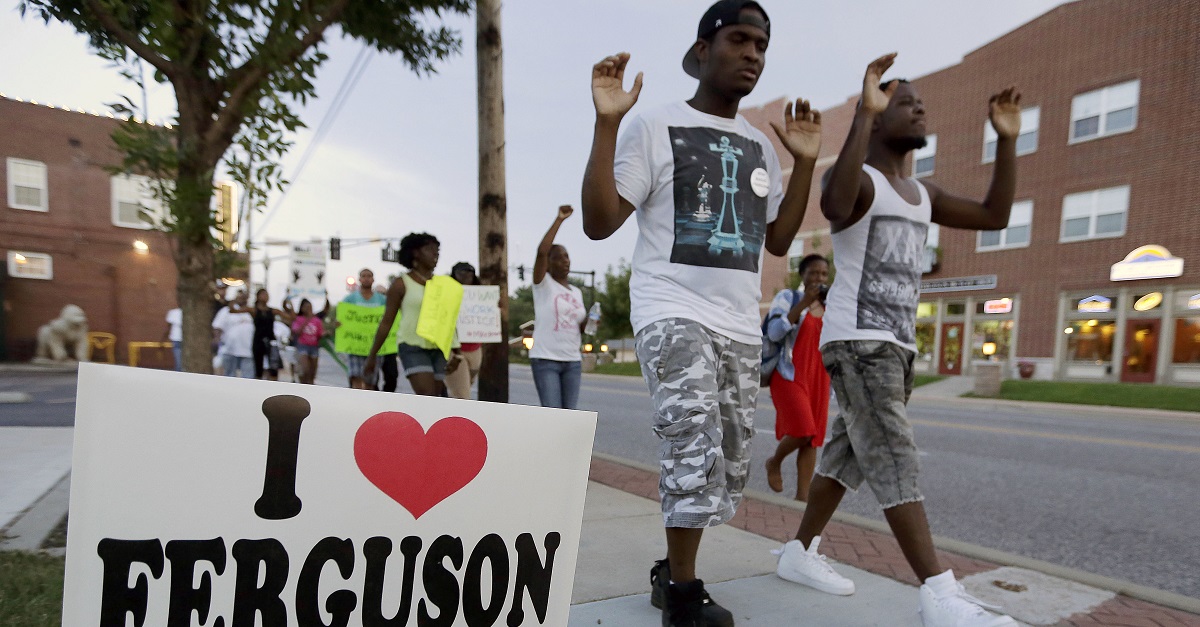Today, New Republic editor Franklin Foer misdiagnoses both the problem and the solution to police encroachments on our civil liberties.
Videos by Rare
“Even though libertarians were plenty prescient in warning about the militarization of the police,” he writes, “they still manage to get it wrong.” Foer takes Rand Paul’s argument that “big government has been at the heart of the problem” in Ferguson, Missouri, and uses that as his launching point:
But what Ferguson shows is that the heart of the problem is, in fact, small government—the cops, prosecutors, and their bosses with an inflated sense of their powers. The great and growing threat to liberty in this country comes from states and localities run amok.
These are boom times for provincial autocrats. In many chunks of the country, state and local politics were once a competitive affair; there was an opposing political party ready to pounce on its foe’s malfeasance. That sort of robust rivalry, however, hardly exists in an era in which blue and red states have become darker shades of themselves. Thirty-seven states now have unified governments, the most since the early ’50s. And in many of these places, there’s not even a remote chance that the ruling party will be deposed in the foreseeable future. The rise of one-party government has been accompanied by the evisceration of the local press and the near-extinction of metro-desk muckrakers (14,000 newsroom jobs have vanished in the last six years), crippling the other force most likely to call attention to official misdeeds.
First, as should be clear to anyone who has paid attention to law enforcement policy over the last 40 years, aggressive law enforcement is not a partisan issue. The Republican record on anti-crime rhetoric is well documented. But one should not forget that the current vice president built his career as a tough-on-crime Democrat, the Clinton Administration ramped up the War on Drugs—perhaps, a cynic might say, because he was the first president to admit to smoking cannabis—and the Congressional Black Caucus backed the 100:1 crack to powder sentencing bill through the solidly Democratic House of Representatives in the 1980s.
When it comes to supporting robust law enforcement, both parties have shown their blue streak.
Second, notice all these punitive policies come from the federal government—the would-be guarantor of our rights, according to Foer. Even as a libertarian—especially one who believes strongly in equal protection—I believe the federal government has a role in overseeing state and local law enforcement’s protection of civil rights. But this hand wringing over hyperpartisan state and local government is misplaced, especially given the myriad criminal justice reforms coming out of solidly red states.
Foer is right that one-party rule causes many problems—including the other problems unrelated to criminal justice he cites—but political malfeasance is a separate issue from decades of bipartisan criminal justice policy and the general public’s tolerance of police misconduct.
But back to the actual issue at hand, Foer cites civil asset forfeiture as the strongest evidence of need for federal intervention. Oh, if this were only the case.
As this Institute for Justice’s 2010 paper on the subject makes clear, the rise civil asset forfeiture is a direct result of federal involvement in local policing. In what are known as “equitable sharing” agreements, federal law enforcement split forfeiture proceeds with state and local law authorities, supposedly in relation to the amount of work the agencies put into the investigation. While the amount of money is discretionary by statute, all reports indicate that the default split is the maximum allowed: 80 percent to local agencies, 20 percent to the federal government.
Even in states that have barred police departments reaping the benefits of their forfeiture—for years, proceeds were typically designated for schools or highways—federal equitable sharing rules mandate those proceeds go directly to the law enforcement agencies, circumventing state laws to prevent “policing for profit.”
The federal government has led the growth of police departments, through COPS and Byrne Justice grants, as well as made them more militarized, via Pentagon and DHS giveaways. Through these subsidies, the federal government has made their “wars” on drugs and terror national policing priorities, eroding our civil liberties in the process.
Oddly, via the Madisonian federalism Foer cites in support of his argument, states have been chipping away at federal marijuana policy for decades, specifically medical marijuana, with full legalization of certain quantities of cannabis in two states effective just this year.
Perhaps Foer should be less concerned with where libertarians focus their attention and more time understanding the policy changes that seem to so easily fit into his worldview. Criminal justice reform is both a national and local issue, and we need reforms at all levels of government if we want to make life better for the millions affected by our current criminal justice policies.
One doesn’t necessarily need to start at the federal government, but doing so is hardly as misguided as Foer’s argument is.



